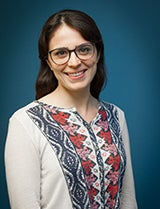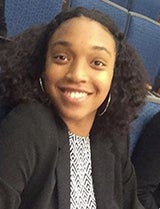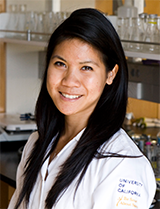UCAR names inaugural Next Generation Fellows
Program supports pursuit of Earth system science, public policy, diversity and inclusion
Nov 21, 2017 - by Staff
Nov 21, 2017 - by Staff
BOULDER, Colo. — The University Corporation for Atmospheric Research has announced winners of the inaugural UCAR Next Generation Fellowships. The first cohort of three graduate students was selected from a highly competitive field. The fellowships are intended for graduate students from underrepresented communities who hold an undergraduate degree in atmospheric or related Earth system science and are attending a North American university for graduate work. Successful candidates receive financial support for two years of graduate school and two summer internships.
The program offers three distinct tracks: Earth system science, diversity and inclusion in the Earth system sciences, and public policy.
"I am excited to welcome this talented inaugural cohort," said Antonio Busalacchi, UCAR president. "We created the Next Generation Fellowships because we recognize the value and importance of fostering greater diversity in Earth system science. I look forward to the mutual benefits that interaction with our new fellows will bring and welcome them to the UCAR community."
(*indicates a UCAR Member Institution)
Carnegie Mellon University

At Carnegie Mellon University, Tania Lopez is studying civil and environmental engineering as a first-year Ph.D. student. Her examination of engineering design standards and of changes in observed extreme precipitation are the first phases in her research on the impact of climate change on precipitation patterns for stormwater infrastructure design decisions, performance, and resilience. Lopez is interested in developing more expertise in computational and statistical tools for analyzing precipitation data and understanding changes in current and projected future patterns. These interests will bring her to Boulder to strengthen collaboration with NCAR scientists during her summer internships in 2018 and 2019.
Lopez received a B.S. in engineering physics from Mexico's Monterrey Institute of Technology and Higher Education (ITESM). She credits her family’s encouragement for her persistence pursuing and achieving her goals. "Despite the difficulties I came across pursuing higher education, I was not discouraged," she said. "My desire grew stronger and I could envision a clearer goal." That included a master’s in civil and environmental engineering at Carnegie Mellon, which she earned on the way to her current doctoral studies. "I have always felt passionate about my field, my decisions, and speaking up for minority inclusion," she said. Lopez sums up her career ambitions this way: "to serve as an effective intermediary between climate science and decision making concerned with engineered systems, where human needs and climate interact."
Pennsylvania State University*

First-year doctoral student Aara’L Yarber is in the meteorology program at Pennsylvania State University. She is studying atmospheric and climate dynamics and their societal impacts, with particular interest in Africa and the Caribbean. Yarber is planning research using WRF, the Weather Research and Forecasting model, along with its dust module, with the goals of developing an observation network in West Africa and of improving understanding of dust transport and its linkage to respiratory disease. She will continue focusing on her dual interests in environmental science and environmental justice during her 2018 and 2019 summer internships in Boulder with the UCAR Office of Diversity and Inclusion.
Yarber began her undergraduate studies at Howard University* with a focus on physics and astronomy. With several undergraduate courses in weather and climate under her belt, she then participated in an atmospheric field campaign in Sal, Cape Verde. It was the summer before her senior year, and during the campaign she "became fascinated with weather, climate, and air quality, and the effects of these phenomena on underrepresented groups." In pursuit of atmospheric science, she hopes "to contribute not only to scientific advancement but also positively influence social and environmental change." Her career goals include advocating for diversity in atmospheric science "not only for the sole purpose of scientific advancement but to provide voices for communities that have long faced environmental inequity."
University of California, Irvine*

Linh Anh Cát is in the fourth year of the doctoral program in ecology at the University of California, Irvine. In addition to her dissertation work on patterns of fungal disease dispersal and climate change, she has written a science policy review linking that research to her public policy focus. The review examines valley fever, a fungal disease prevalent in the U.S. Southwest, and calls for binational cooperation with Mexico to study the negative impact of climate change on exposure. She will explore her policy interests during her summer 2018 and 2019 internships with UCAR’s Washington, D.C., office.
For her undergraduate work at the University of Central Florida, Cát earned dual bachelor of science degrees in environmental studies (policy track) and in biology. She has contributed to an array of activities during her academic career that reflect her interest in working at the intersections of diversity, equity, inclusion, and science policy. In addition to her studies, these activities have ranged from organizing local science outreach events to serving on the American Association of University Women’s National Student Advisory Council to tackle women and minority representation in STEM. "My goal is to be a leader in science policy," Cát said. "I want to work on enacting innovative policies at the intersection between climate change, air quality, human health, and the disproportionate impact on women and minorities."